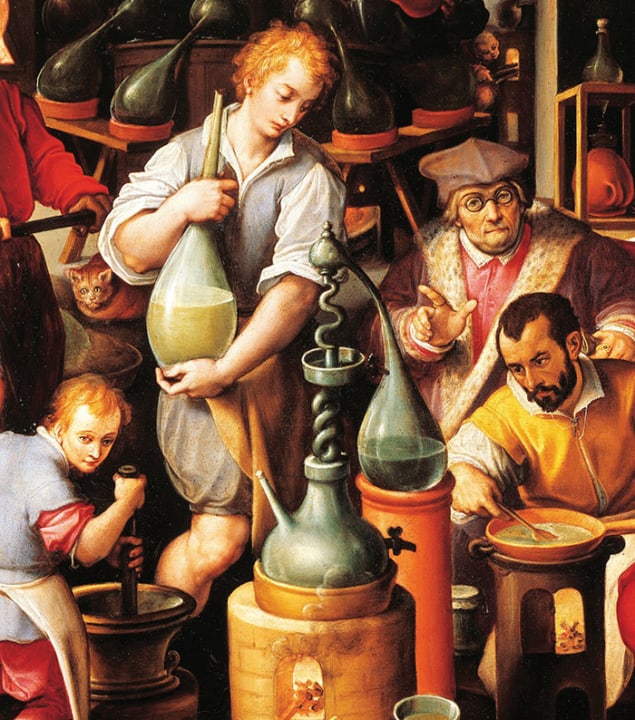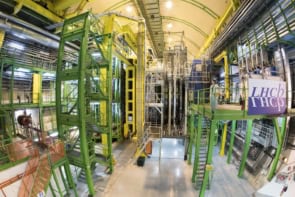Robert P Crease notes a remarkable absence at the heart of Francis Bacon’s 17th-century vision New Atlantis

In around 1612, an English vessel set sail across the Pacific westbound from Peru with a year’s worth of supplies. At first the winds blew favourably, but after a few months they changed direction. For a while, the boat’s progress merely stalled but eventually the sailors were blown far off their route. Struggling against the elements, they exhausted their provisions and many fell ill. Abandoned to nature – and feeling lost in “the greatest wilderness of waters in the world” – they gave up hope, prayed and “prepared for death”.
A miracle saved them. Cloud formations appeared that usually indicate land, and the sailors headed that way. Soon they came upon a hitherto unknown island with a small but well-built port. After landing and disembarking, the crew learned that the island, called Bensalem – a name that joins a Hebrew word meaning son or offspring with one meaning peace, safety or completeness – was efficiently and wisely ruled by an academy of scientists called Salomon’s House. The sick sailors were cured, and those who had been victims of nature now felt free.
Thus begins New Atlantis by the philosopher and scientist Francis Bacon (1561–1626). Like any parable, its metaphors are easy to decode. The vessel represents humanity making its long journey in an often unpredictable and threatening world. Without special knowledge of this world, the sailors get weary, sick and lost. When finally saved, their first instinct is to attribute their salvation to a miracle, though in reality they were saved and cured by humans who had taught themselves to understand and control nature – even, apparently, the weather conditions that brought the sailors to the island.
Bensalem is Bacon’s vision of a community organized to take full advantage of science and technology. He realized that science and technology would not only revolutionize how we think about the world, but also how we must organize ourselves socially and politically. Scholars find New Atlantis fascinating because, before the advent of modern science, Bacon understood how vastly collaborative an effort it would have to be.
Bacon describes Bensalem as open to diversity. While predominantly Christian, for instance, it includes a practising Jewish community whose members are regarded as equals. But where are the women? While Bacon has been taken to task for his occasional use of sexist language (“Cooking Bacon”, November 2015), I am unaware of anyone who has discussed the virtual absence of women from his scientific utopia.
The vessel that sails into Bensalem does not seem to have any women on board. Salomon’s House, while having men and women among its attendants and servants, is governed by a board of “fathers”. Still more disturbing is Bacon’s description of Bensalem’s “Feast of the Family,” which celebrates men who have sired 30 living descendants. During this festival, the father is seated on a special chair whose canopy has been decorated by his daughters. The mother? She’s kept out of sight in a room off to the side behind a concealed door.
How could Bacon – a prophet of the scientific and technological age – have been so dismissive of 50% of its population?
I can think of two possible ways to be charitable to Bacon, neither convincing. One is to say that neglecting women was not Bacon’s intention, and that New Atlantis is incomplete. After all, it was published posthumously by William Rawley, Bacon’s secretary, who added the phrase “a work unfinished” to its title. Rawley noticed that the parable contains virtually no discussion of political and social matters, which one naturally expects in a discussion of a utopia, and concluded that the work must be unfinished. Surely, we might say, he would have added women in completing it.
I don’t buy that argument. The story contains no real openings for such a discussion. Moreover, the description of the feast is complete – and it shuts away the matriarch.
The second way would be to say that Bacon was a man of his time. He wasn’t writing about women but how science and technology would change the world. His account simply reflects the atmosphere of the world he was living in, which lacked women in leadership positions.
This, too, is nonsense. Queen Elizabeth I was England’s monarch during the first part of his career; Bacon grew up in her royal household and served as her counsel. More importantly, Bacon was far-sighted in other regards. In New Atlantis he foresaw, long before the advent of modern science, not only the rich and extensive array of instruments, devices, materials and labs needed in a fully functioning scientific community, but its social structure too, including teachers, publishers, technicians, libraries and museums. He anticipated the powers and dangers of technology, and the conflicts that might arise between scientific communities and the state. How could it be that he foresaw no women as having a role in his “offspring of completeness”?
The absence of women is a deep flaw in Bacon’s New Atlantis , but I can’t figure out why it’s there. I don’t see the place as inherently patriarchal, so why weren’t women equal participants? Today it would be unthinkable to see women as anything but equal collaborators in any vision of a flourishing scientific community.
The critical point
That locked-up matriarch in Bacon’s tale haunts me. She makes me wonder if his motive was to banish a potentially disruptive presence. But why did he see women as potentially disruptive? Recent cases of sexual harassment in science – coupled with ongoing controversy over why there are so few women in science – make me suspect that the undercurrents of sexism, four centuries after Bacon, are more powerful than we suspect, so that detecting and eradicating them will be harder than we think.



